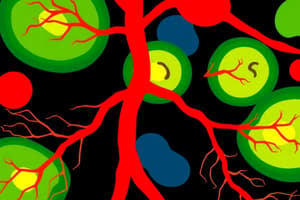Podcast
Questions and Answers
What are the different components of the lymphatic system?
What are the different components of the lymphatic system?
- Lymph nodes
- Lymphatic vessels
- Lymphatic ducts
- All of the above (correct)
What is the functional role of primary lymphoid tissue?
What is the functional role of primary lymphoid tissue?
- T-cell maturation (correct)
- B-cell maturation
- Both A and B
- None of the above
The thymus is a primary lymphoid organ that is the site of maturation of B-lymphocytes.
The thymus is a primary lymphoid organ that is the site of maturation of B-lymphocytes.
False (B)
What is the name of the structure that supports the developing T-cells within the thymus?
What is the name of the structure that supports the developing T-cells within the thymus?
The blood-thymus barrier prevents contact of developing T-cells in the cortex with any foreign antigens circulating in blood.
The blood-thymus barrier prevents contact of developing T-cells in the cortex with any foreign antigens circulating in blood.
What is the name of the structure that houses mostly T cells and is the thymus-dependent zone of a lymph node?
What is the name of the structure that houses mostly T cells and is the thymus-dependent zone of a lymph node?
Which of the following statements about the medulla of a lymph node is FALSE?
Which of the following statements about the medulla of a lymph node is FALSE?
How do lymphocytes exit the lymph node?
How do lymphocytes exit the lymph node?
Lymphadenitis is a secondary inflammation of the lymph nodes.
Lymphadenitis is a secondary inflammation of the lymph nodes.
What is the term for a localized type of edema that occurs when lymph does not drain from an area of the body properly?
What is the term for a localized type of edema that occurs when lymph does not drain from an area of the body properly?
Flashcards
Lymph
Lymph
A clear fluid that travels through lymphatic vessels, transporting excess fluid, waste products, and immune cells.
Chyle
Chyle
A milky fluid found in lymphatic vessels of the small intestine, rich in fats absorbed from digested food.
Lymphatic System
Lymphatic System
A network of vessels, tissues, and organs that help maintain fluid balance, filter waste, and transport immune cells.
Lymph Nodes
Lymph Nodes
Signup and view all the flashcards
Lymphatic Vessels
Lymphatic Vessels
Signup and view all the flashcards
Lymphatic Ducts
Lymphatic Ducts
Signup and view all the flashcards
Thoracic Duct
Thoracic Duct
Signup and view all the flashcards
Right Lymphatic Duct
Right Lymphatic Duct
Signup and view all the flashcards
Stroma
Stroma
Signup and view all the flashcards
Parenchyma
Parenchyma
Signup and view all the flashcards
Thymus
Thymus
Signup and view all the flashcards
Involution
Involution
Signup and view all the flashcards
Thymus Cortex
Thymus Cortex
Signup and view all the flashcards
Thymus Medulla
Thymus Medulla
Signup and view all the flashcards
Blood-Thymic Barrier
Blood-Thymic Barrier
Signup and view all the flashcards
Epithelial Reticular Cells
Epithelial Reticular Cells
Signup and view all the flashcards
Hassall's Corpuscles
Hassall's Corpuscles
Signup and view all the flashcards
Lymphoid Nodules
Lymphoid Nodules
Signup and view all the flashcards
Primary Lymphoid Nodules
Primary Lymphoid Nodules
Signup and view all the flashcards
Secondary Lymphoid Nodules
Secondary Lymphoid Nodules
Signup and view all the flashcards
Paracortex
Paracortex
Signup and view all the flashcards
High Endothelial Venules (HEVs)
High Endothelial Venules (HEVs)
Signup and view all the flashcards
Medulla
Medulla
Signup and view all the flashcards
Medullary Cords
Medullary Cords
Signup and view all the flashcards
Lymphatic Sinusoids
Lymphatic Sinusoids
Signup and view all the flashcards
Lymphangitis
Lymphangitis
Signup and view all the flashcards
Lymphadenitis
Lymphadenitis
Signup and view all the flashcards
Lymphedema
Lymphedema
Signup and view all the flashcards
Lymphogenous Spread
Lymphogenous Spread
Signup and view all the flashcards
Septicemia
Septicemia
Signup and view all the flashcards
Study Notes
Lymphatic System
- The lymphatic system is composed of lymph nodes, lymphatic vessels, and lymphatic ducts.
- It collects excess interstitial fluid and returns it to the circulatory system.
- Lymph is the clear, colorless fluid found in most lymphatic vessels. Chyle is milky lymph, containing fats from the small intestine.
- Lymphatic vessels are absent in the brain, bone marrow, and avascular tissues (like epithelia and cartilage).
- Lymphatic flow is unidirectional and maintained via valves within the vessels.
Specialized Immune Tissue
- Lymphoid organs are composed of two major parts:
- Stroma: supportive connective tissue framework (capsule and trabeculae, fine reticular fibers).
- Parenchyma: functional cellular component (outer cortex, inner medulla, etc.)
The Thymus
- A primary lymphoid organ where T lymphocytes mature.
- The thymus begins to involute, or shrink, after puberty.
- It continues to function into adulthood.
- The thymus is composed of a cortex and a medulla; septa divide the lobes into incomplete lobules.
- Hassall's corpuscles are a characteristic feature of the medulla, increasing in number with age.
Lymph Nodes
- Small, oval, encapsulated structures along lymphatic vessels.
- They have a convex outer surface and a concave hilum (containing efferent and afferent lymphatic vessels, and blood vessels).
- Divided into three zones: cortex, paracortex, and medulla (containing primary and secondary nodules, B and T lymphocytes, macrophages and plasma cells).
Functions of Lymph Nodes
- Filtration of lymph
- Antigen recognition
- Humoral immune response (antibody production by plasma cells)
- Cell-mediated immune response (T-cell activity)
Clinical Correlations
- Lymphangitis and lymphadenitis are inflammations of lymphatic vessels and lymph nodes, respectively, often resulting from infection.
- Lymphedema occurs when lymph flow is obstructed, leading to fluid buildup.
- Cancerous lymph nodes can be surgically removed, potentially leading to secondary lymphedema.
Studying That Suits You
Use AI to generate personalized quizzes and flashcards to suit your learning preferences.




